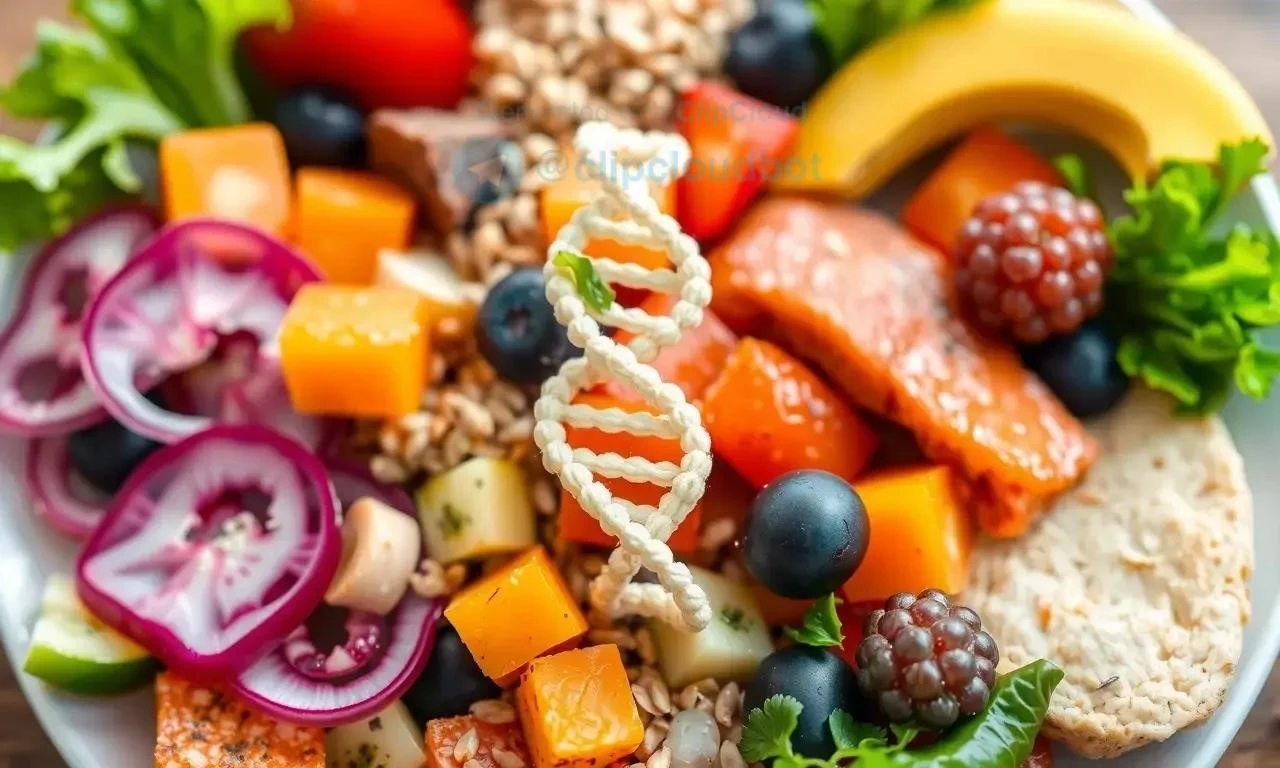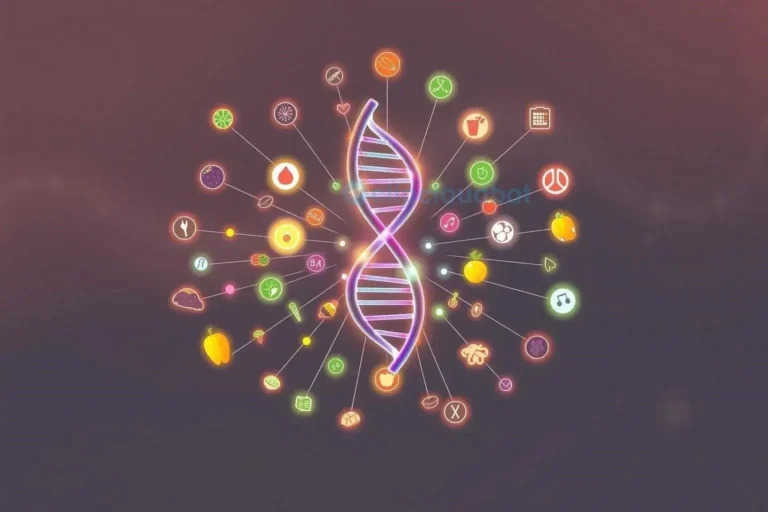Personalized Nutrition: Tailoring Diets for Optimal Health
Gone are the days of generic dietary advice. Personalized nutrition recognizes that each individual’s body responds uniquely to food. Factors like genetics, lifestyle, and environment play crucial roles in determining optimal dietary choices. This approach moves away from one-size-fits-all recommendations and embraces tailored strategies to optimize health and well-being through individualized nutrition plans. By understanding your specific needs, you can unlock the power of food to achieve your health goals.
Understanding Your Unique Body’s Needs
Delving into personalized nutrition begins with understanding your body’s unique requirements. This goes beyond simply counting calories or following generic dietary guidelines. It involves a deeper exploration of various factors that influence how your body processes nutrients and responds to different foods. Several key elements contribute to this understanding:
- Metabolic Rate: Your basal metabolic rate (BMR) dictates how many calories your body burns at rest. Factors such as age, gender, muscle mass, and genetics influence BMR. Understanding your individual metabolic rate is crucial for determining appropriate calorie intake for weight management and overall health.
- Macronutrient Needs: The optimal ratio of carbohydrates, proteins, and fats varies from person to person. Factors like activity level, metabolic health, and specific health goals play a role in determining the ideal macronutrient distribution for your body. Some individuals thrive on higher-protein diets, while others may benefit from a higher intake of healthy fats.
- Micronutrient Deficiencies: Micronutrient deficiencies can significantly impact health and well-being. Identifying any existing deficiencies through blood tests and addressing them through dietary changes or supplementation is an important aspect of personalized nutrition. Common deficiencies include iron, vitamin D, and vitamin B12.
- Food Sensitivities and Intolerances: Unlike food allergies, which trigger immediate immune responses, food sensitivities and intolerances can cause a range of subtle symptoms that can be difficult to pinpoint. Identifying and eliminating trigger foods can significantly improve digestive health, energy levels, and overall well-being.
- Lifestyle Factors: Stress levels, sleep patterns, and physical activity all influence your body’s nutritional needs. Personalized nutrition takes these factors into account, offering tailored recommendations to support your individual lifestyle. For instance, athletes may require higher calorie and protein intake compared to sedentary individuals.
- Gut Microbiome Composition: The trillions of bacteria residing in your gut play a vital role in nutrient absorption, immune function, and overall health. The composition of your gut microbiome can influence how your body responds to different foods. Emerging research suggests that personalized nutrition can target the gut microbiome through specific dietary interventions, promoting a healthier gut ecosystem.
By considering these individual factors, personalized nutrition empowers you to make informed food choices that align with your unique body’s needs, paving the way for optimal health and well-being.
The Role of Genetics in Nutrition
The burgeoning field of nutrigenetics explores the fascinating interplay between our genes and our nutritional needs. It recognizes that our genetic makeup plays a significant role in how we process nutrients, metabolize foods, and respond to dietary interventions. Understanding these genetic influences is a cornerstone of personalized nutrition.
Genetic Variations and Nutrient Metabolism: Variations in our genes can affect how efficiently we absorb and utilize certain nutrients. For example, some individuals possess genetic variations that make them more susceptible to vitamin D deficiency, while others may have a reduced ability to metabolize caffeine. Nutrigenetics allows us to identify these variations and tailor dietary recommendations accordingly.
Genetic Predispositions and Disease Risk: Our genes can also influence our predisposition to certain diet-related diseases. For example, some individuals carry genes that increase their risk of developing type 2 diabetes or heart disease. Personalized nutrition, informed by genetic insights, can help mitigate these risks by recommending specific dietary strategies that address individual genetic predispositions.
Gene-Nutrient Interactions: Nutrigenetics also investigates the complex interactions between specific genes and nutrients. For example, certain genes influence how our bodies respond to dietary fats, while others play a role in carbohydrate metabolism. Understanding these gene-nutrient interactions allows us to optimize our diets based on our individual genetic profiles.
Genetic Testing and Personalized Dietary Advice: Advances in genetic testing have made it increasingly accessible to obtain insights into our individual genetic makeup. This information can be used to develop personalized dietary recommendations that target specific genetic variations and optimize nutrient intake. Genetic testing can reveal predispositions to nutrient deficiencies, sensitivities to certain foods, and potential risks for diet-related diseases.
Limitations and Ethical Considerations: While nutrigenetics holds immense promise, it’s important to acknowledge its limitations. Genetic testing provides valuable information, but it’s not a crystal ball. Environmental factors and lifestyle choices also play significant roles in health outcomes. Furthermore, ethical considerations surrounding genetic testing, such as data privacy and potential for misinterpretation of results, must be carefully addressed.
The Future of Nutrigenetics: As research in nutrigenetics continues to evolve, we can expect even more refined personalized dietary recommendations based on individual genetic profiles. This field has the potential to revolutionize how we approach nutrition, empowering individuals to make informed food choices that optimize their health and well-being based on their unique genetic blueprint.
Precision Eating: Practical Applications
Precision eating translates the science of personalized nutrition into actionable dietary strategies. It moves beyond general guidelines and empowers individuals to make informed food choices tailored to their unique needs and goals. This approach encompasses a variety of practical applications:
Targeted Meal Planning: Based on individual assessments, precision eating facilitates the creation of personalized meal plans. These plans consider factors such as metabolic rate, macronutrient needs, food sensitivities, and genetic predispositions. They provide specific recommendations for portion sizes, food combinations, and meal timing to optimize nutrient intake and support individual health goals.
Personalized Food Recommendations: Precision eating goes beyond generic food pyramids and offers specific food recommendations tailored to individual needs. This may involve incorporating specific nutrient-rich foods to address deficiencies, limiting certain foods based on sensitivities, or choosing specific types of carbohydrates based on metabolic profile.
Nutrient Timing and Optimization: Precision eating recognizes that the timing of nutrient intake can influence how our bodies utilize those nutrients. For example, consuming protein after exercise can enhance muscle protein synthesis. Precision eating provides guidance on nutrient timing to maximize the benefits of dietary interventions.
Technology-Assisted Dietary Tracking: Mobile apps and wearable devices are increasingly utilized in precision eating to track dietary intake, monitor activity levels, and provide personalized feedback. These tools can help individuals stay on track with their personalized nutrition plans and make adjustments as needed.
Integration with Lifestyle Factors: Precision eating considers the interplay between diet and other lifestyle factors such as sleep, stress, and exercise. It provides personalized recommendations to optimize these lifestyle factors in conjunction with dietary changes to achieve holistic well-being.
Working with Registered Dietitians: Consulting with a registered dietitian specializing in personalized nutrition is crucial for implementing precision eating effectively. A dietitian can conduct comprehensive assessments, interpret genetic testing results, and develop individualized nutrition plans tailored to specific needs and goals.
Real-World Examples: Consider an individual with a genetic predisposition to iron deficiency. Precision eating would involve recommending iron-rich foods, optimizing iron absorption through strategic food pairings, and potentially suggesting iron supplementation. Another example is an athlete seeking to improve performance. Precision eating would focus on optimizing carbohydrate and protein intake around training sessions to enhance energy levels and muscle recovery.
By incorporating these practical applications, precision eating empowers individuals to take control of their nutrition and optimize their health outcomes through tailored dietary strategies.
The Future of Nutritional Science and Dietary Recommendations
Nutritional science is on the cusp of a transformative era, moving away from generalized advice towards personalized, data-driven recommendations. Several exciting advancements are shaping the future of nutrition:
Artificial Intelligence and Machine Learning: AI and machine learning algorithms are being employed to analyze vast datasets of individual health information, including genetic data, dietary habits, and lifestyle factors. This allows for the development of highly personalized dietary recommendations with greater precision and predictive capabilities.
Advanced Diagnostic Tools: Emerging technologies, such as continuous glucose monitors and wearable sensors, provide real-time data on individual metabolic responses to different foods. This information can be used to fine-tune dietary recommendations and optimize nutrient timing for improved health outcomes.
Integration of Omics Data: Beyond genomics, other “omics” fields, such as proteomics (study of proteins) and metabolomics (study of metabolites), are providing deeper insights into individual metabolic processes. Integrating these data sets with dietary information allows for a more comprehensive understanding of how our bodies respond to food.
Personalized Supplements and Functional Foods: The future of nutrition may involve personalized supplements and functional foods tailored to individual genetic and metabolic profiles. These products could address specific nutrient deficiencies, optimize gut microbiome health, and support individual health goals with greater precision.
Focus on Preventative Health: Personalized nutrition has the potential to shift the focus from disease treatment to disease prevention. By identifying individual risk factors and tailoring dietary interventions early on, we can proactively mitigate the risk of developing chronic diseases.
Challenges and Opportunities: While the future of nutritional science holds immense promise, challenges remain. Standardizing data collection methods, ensuring data privacy, and addressing ethical concerns surrounding personalized health information are crucial for responsible implementation of these advancements.
The Vision of a Healthier Future: The ultimate goal of these advancements is to empower individuals to take control of their health through personalized nutrition. Imagine a future where dietary recommendations are tailored to your unique genetic makeup, metabolic profile, and lifestyle, optimizing your well-being and preventing chronic diseases. This vision is rapidly becoming a reality, thanks to the ongoing revolution in nutritional science.




